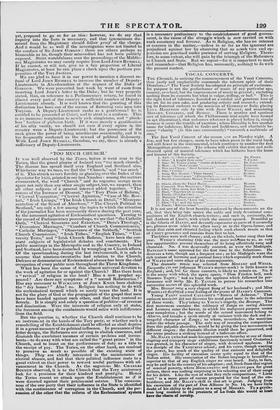"TOO MUCH CHURCH."
IT was well observed by the Times, before it went over to the Tories, that the grand plague of Ireland was "too much church." The disease has spread itself over England and Scotland also. Whichever way we turn, we find the " Church," and " too much " of it. This struck us very forcibly in glancing over the Index of the Spectator for 1835, printed in our last Number : among the matters enumerated, the word ." Church " and its cognates occupy more space not only than any other single subject, but, we suspect, than all other subjects of a general interest added together. "The causes of the Increase of Dissent," the "Tory Plans of Reform," " Clerical Usurpation," "Clerical Agitation," "Case of Mr. Row- lett," "Irish Livings," "The Irish Church in Detail," " Misrepre- sentation of the Synod of Aberdeen," " The Church Political in Scotland," are only a few among the topics to which the attention of the journalist has been necessarily drawn during the past year, by the incessant agitation of Ecclesiastical questions. Turning to the record of Parliamentary proceedings, we see that "the Catholic Oath," "Clerical Sinecures and Extortion," " Dens's Theology," "Dissenters' Marriages," "Conduct of Church Commissioners," " Catholic Marriages," " Observance of the Sabbath," " Scottish Church Commission," "Irish Tithes," "English Tithes," "Uni- versity Tests," and "Irish Church Reform," have been the con- stant subjects of legislatorial debates and enactments. The public meetings in the Metropolis and in the Country, in Ireland and Scotland, have been disturbed by wrangling on Church affairs. Of the speechmaking during the last twelvemonth, it is safe to assume that nineteen-twentieths had relation to the Church. Defence or denunciation of Ecclesiastical abuses has been the chief occupation of every public man throughout the Three Kingdoms. What has been the cause of this almost universal devotion to the work of agitation for or against the Church? Has there been a " revival " of religion in the land? Has a new prophet ap- peared ? Are there any symptoms of a " second Reformation? ' Has any successor to WICKLIFFE or JOHN KNOX been shaking the " dry bones ? " Alas! no. Religion has nothing to do with the ecclesiastical turmoil which so sorely vexes the land. It is not for the glory of God or the propagation of the gospel that men have been banded against each other, and that they contend so fiercely. It is simply and solely a question of politics—of revenue and domination. Were the interests of religion only at stake, the foremost among the combatants would retire with indifference from the field.
But the question is, whether the Church shall continue to be an instrument in the hands of the Tory party, or whether such a remodelling of the Establishment shall be effected as shall deprive it in a great measure of its political influence. In pursuance of the latter design, the Reformers are striving to abolish sinecures, and diminish the exorbitant incomes of certain prelates and incum- bents—to do away with what are called the " great prizes " in the Church, and to insist on the performance of duty as a title to the receipt of pay. The Tories, on the other hand, are resolved to preserve as much as possible of the existing state of things. They are chiefly interested in the maintenance of clerical abuses, and feel that their political influence rests to a great extent on their power to reward useful partisans with ad- vancement in the Church. As the sagacious Mr. CHARLES BOYTON observed, it is to the Church that the Tory aristocracy look for a provision for their kindred and prot6ges. Hence the Tories resent an attack upon the Establishment as if it were directed against their patrimonial estates. The concious- ness of the one party that their influence in the State is identified with the continuance of corruption in the Church, and the per- suasion of the other that the reform of the Ecclesiastical system is a necessary preliminary to the establishment of good govern- ment, is the cause of the struggle which is now carried on with such constancy and fervour. As to Religion, she has no interest or concern in the matter,—unless in so far as the ignorant are prejudiced against her by observing that so much vice and op- pression are practised under pretence of serving Religion. There- fore, to some extent, she will gain by the triumph of the Reformers in Church and State. But we repeat—for it is important to mark and remember—that Religion has, necessarily, nothing to do with the present contest.






























 Previous page
Previous page